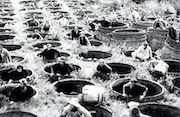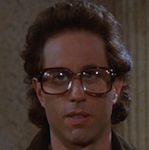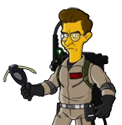|
Timby posted:Kirk: "And what exactly would you like me to do with the rest of his crew, sir? Fire them at the Klingons, end 72 lives, start a war in the process?" Ah, right. My assumption had been that Khan's plan was to get them to bring the missiles he'd built for Marcus, assumingly the 'super' missiles, and surrender before they fired them so he could recover his crew. Which sounded like a pretty smart plan, but apparently Marcus already knew and willingly planned on letting Khan's guys ANYWHERE NEAR HIM. Which is probably the one thing no-one should ever want to do. But then again it worked perfectly, didn't it? I assume because Khan's brethren are the only real thing that would have drawn him out to be killed at all. There are far easier ways to have killed Khan and his crew, but he was trying to do it in an artful way which works not only as a story device but also serves his character - he's just not all that bright. The guy wants to initiate a war, but somehow ignored, for example, the fact that Khan took out a bunch of Starfleet officials and then jumped across the Universe to Klingon space. In a traceable way that you could show to anyone. If that's not an act of attrition, I don't know what is. Getting the enterprise destroyed probably wouldn't be much help if you then had to fight a war, isn't the Enterprise meant to be like the bestest ship ever or something? Not to mention getting a useful Captain killed who appears to be, not only through his actions but according to people who have come back from the loving future, destined for great things. ...BUT WAIT! THIS version of Kirk's a loving mess, isn't he, running around with a blatant disregard for the Prime Directive and other laws he doesn't happen to like. Who cares what happens to him, the guy's a crazy-rear end loose canon who wants revenge for what just happened! His 'conscience' wouldn't serve Marcus very well when he starts ordering people to go to war and follow even more strict and militarised orders. The guy's trying to kill three birds with one stone, not two. He starts his war, he wipes out his mistakes in trying to use Khan for his personal gain, and he purges Starfleet of someone unfit for command in a militarised state. The guy's a loving genius, isn't he? A genius who happens to really like dispatching people in manners that befit them. Which while not strictly something I'd imagine a warmonger to do, is definitely the sort of crazyhorse character trait an Admiral would have in Starfleet, the organisation that brought you 'don't save a doomed planet because Playing God is evil or something'. EDIT: Added a paragraph gap. Boy was this a lot of Hbomberguy fucked around with this message at 14:11 on Sep 26, 2013 |
|
|
|

|
| # ? May 26, 2024 16:25 |
|
Snak posted:IN the film they say that the fuel was removed in order to put the cryotubes in. It does prompt the question: if these torpedoes will work totally fine without the fuel, what was it for? Actually, on a rewatch I think they actually say the fuel component was "moved" not "removed". And being Star Trek, it doesn't have to be a big tank of fuel, especially since Scotty's complaint implies that the torpedo tubes themselves actually power/fire/accelerate the torpedoes up to speed. DFu4ever fucked around with this message at 13:53 on Sep 26, 2013 |
|
|
|
Everybody chill the torpedoes fly on a straight line shot out of the enterprise so shooting them on a planet is OK without fuel. If the target does evasive poo poo, that's where you need fuel.
|
|
|
|
Hbomberguy posted:Khan took out a bunch of Starfleet officials and then jumped across the Universe to Klingon space. In a traceable way that you could show to anyone. People keep forgetting this: it wasn't a traceable method you could just show anyone. Kirk showed the transwarp module to Scotty, who was able to decipher where Khan had went because he was its inventor.
|
|
|
|
As a counterpoint though, didn't Scotty comment that Starfleet made him give up the formula for the long range transporter to them, so in theory anyone at Starfleet with some time and manpower could have maybe figured it out, too. Unless it was Khan who Marcus had doing all the transwarp teleporter work and literally no one else new how to do it.
|
|
|
|
They load Spock into a torpedo in Wrath of Khan.
|
|
|
|
JediTalentAgent posted:As a counterpoint though, didn't Scotty comment that Starfleet made him give up the formula for the long range transporter to them, so in theory anyone at Starfleet with some time and manpower could have maybe figured it out, too. Wasn't that supposed to be pretty much what happened, the team tasked with reverse engineering it was Khan and those covert ops dudes Khan had blown up in the very beginning. IDK why they keep whipping out the personal super-teleporter as a one-shot macguffin they reference and then never really do anything much with, but I kinda hope that it's because for the third movie Abrams is planning to go "You know what? gently caress this rehashing everything that ever happened in Star Trek biz, I wanna make The Stars My Destination."
|
|
|
|
Yeah, that seems to be the implication of Scotty's reaction to the device. He's upset that not only did they confiscate his work, but they seem to have handed it over to a super villain. I would love for any film to basically be The Stars My Destination.
|
|
|
|
Timby posted:No one ever accused Starfleet admirals of being particularly smart. (In fact, that's kind of a running theme throughout all of Star Trek -- very few admirals are effective or intelligent.) Also see: Admiral Janeway.
|
|
|
|
MisterBibs posted:I think Photon Torpedo are basically matter/anti-matter explosions; I figured it just used the people in the cryotubes for the matter. A human body's worth of matter being annihilated would be uhhhh... quite something to see. In the neighborhood of 4GT. Holy poo poo. The entire PEOPLE IN TORPEDOES plot was completely terrible and if they'd just done away with that, then they could have avoided all the horrible contortions of logic and action required to keep the "story" together. And finally, JJ Abrams agrees with me that he's a hack: http://www.craveonline.com/film/interviews/569755-exclusive-j-j-abrams-apologizes-for-his-lens-flares I stand vindicated.
|
|
|
|
AlternateAccount posted:
Death of the author.
|
|
|
|
Exclusive: J.J. Abrams Takes Self Less Seriously Than Humorless Trek Fans
|
|
|
|
Lens flare supremacy.
|
|
|
|
How Star Trek into Darkness should have ended. https://www.youtube.com/watch?v=4N15J4ibej8 
|
|
|
|
EDIT: Reading over what I just posted, this pretty much does sound like "rantings of a butt-hurt Star Trek fan" but ehhh, it's still something I'd like to discuss and see what others think about the general perception of the Star Trek movies (and probably franchise in general). So over in the "Let's watch badly reviewed movies thread" there was someone who went through the entirety of the first ten Star Trek films, which surprised me a bit since the movie series, on the whole, were well-received and mostly got good reviews from critics and audiences alike. I asked about it and 'Snak' gave this response: Snak posted:I would hazard a guess that it's similar to the difference between Genre Fiction and Literature. This distinction does not properly exist in the world of cinema yet, although some try to draw it as the distinction between movies and films. It's not a distinction that necessarily needs to exist as long as we acknowledge that reviews have context and do not exist in a vaccuum. Almost every Star Trek movie is absolute poo poo if you don't know anything at all about star trek going into it. trek movies often have what would normally be a b-movie level of quality to them. This isn't a dig on star trek, but it's important to recognize the vast difference between "This is a good star trek movie" and "This is a good movie". Look no further than Star Trek: First Contact which has an astonishing 92% on rottentomatoes. If it was not a star trek movie, many critics would not have given it a pass, but because almost all critics looked at it as a trek film, a lot of them liked it. Then I replied: lizardman posted:I get the general thrust of your argument, but... I just can't agree that this applies here. 'Having a b-movie level of quality but getting a pass (sometimes) because it hits certain tropes well for its target audience' is something I'd expect to hear about Friday the 13th or Godzilla sequels, not Star Trek. I'll concede that having a passing familiarity with the franchise is sometimes necessary to get 100% enjoyment of the movies, but I think that's more a matter of the series' universe being so drat big than anything else. The movies don't even necessarily follow a formula the way James Bond movies do, the appreciation they get is very genuine. Continuing here,I don't personally have any problem with someone not caring for the Star Trek movies, but it does remind me that there's been this pervasive (and baffling to me) revisionist narrative that's taken over since the first Abrams Trek movie came out that basically posits that the Star Trek film series were all cheap B-movies that managed to eke out a small profit by relying on nostalgia from a niche audience of sci-fi geeks, and that really just isn't true. On the first point, the Trek movies almost across the board boasted high production values and cutting-edge special effects for their time, and if they didn't have massive budgets it was because they were able to re-use sets and effects models from previous movies. On the second point, there's no question that Star Trek has a notoriously mammoth-sized geek fanbase, but that's par for the course with the sci-fi genre. Star Wars does, too, but I don't think anyone would argue that that franchise isn't mainstream and liked for 'genuine' artistic reasons. The post replying to me in that other thread cites First Contact, but I think that's actually a pretty poor example for his point, as that movie was such a big hit for that period of that series entirely because it reached outside the typical geek base of fans and wasn't 'just a Star Trek movie' and helped it regain some of the success and acclaim from audiences and critics the series enjoyed more consistently in the 80s, and it's actually the fanbase that has problems with that movie. People genuinely liked it! I guess my main point, especially how it relates to the current thread, is the Star Trek movies series of yore is not at all that different from the one currently running. They were mainstream blockbusters, perhaps not on the level of Star Wars or Indiana Jones, but certainly on par with, say, X-Men orrrrr.... Abrams' Star Trek movies, in fact. The notion that they weren't, either to discredit the new movie series or the old, might be the most annoying thing to come out of the latest movies' existence.
|
|
|
|
lizardman posted:On the first point, the Trek movies almost across the board boasted high production values and cutting-edge special effects for their time, and if they didn't have massive budgets it was because they were able to re-use sets and effects models from previous movies. 1)Most Star Trek movies look like they were done on TV episode budgets and it showed in crappy looking sets and uninspired lighting and camera movements. 2)I don't think Star Wars films as a whole are great pieces of art (though I think the acting and cinematography and effects in ESB really kick that one several notches above the rest). 3)What's the most well-liked Star Trek movies, among fans anyways? I'm guessing TWOK and TUC - these films are pretty clear (to me at least) examples of being really good examples of genre fiction but not great when judged on their own merits. If I compare the best Star Trek with something like House of Cards or Breaking Bad, Star Trek will pretty much fall short every time. Let's look at the things that make for great experiences on the small and big screen - Does the plot make sense? Is the camera doing interesting things? Does the lighting compliment the story? Are the sets well made? What about costumes and makeup? Acting? If I look at any Star Trek film they'll usually fall short in several of these areas, and I can't be the only person who thinks like this. And I *love* Star Trek - the average cinema-goer is probably a lot less forgiving of these flaws even if they don't have the vocabulary or training to articulate why something is bad. So yeah, a lot of sci-fi is bad. I mean there's a lot worse out there, but being king of a pile of poo poo isn't super impressive to me.
|
|
|
|
1st AD posted:If I compare the best Star Trek with something like House of Cards or Breaking Bad, Star Trek will pretty much fall short every time. Let's look at the things that make for great experiences on the small and big screen - Does the plot make sense? Is the camera doing interesting things? Does the lighting compliment the story? Are the sets well made? What about costumes and makeup? Acting? If I look at any Star Trek film they'll usually fall short in several of these areas, and I can't be the only person who thinks like this. Well, it speaks more to your subjective tastes and the problem with comparing two things (Star Trek and those shows) that are vastly different in both tone, scope, and what the filmmakers are trying to accomplish. Not to mention that in one case you would be comparing shows from 2013 with a film from 1982. Yes, there are some bad Trek movies. Legitimately so. But the good Trek films do stand up pretty well on their own merits when held to the standards of the time they were made, and the type of movie that the creators intended to make. 1st AD posted:So yeah, a lot of sci-fi is bad. I mean there's a lot worse out there, but being king of a pile of poo poo isn't super impressive to me. To be fair, at least with sci-fi you tend to be working with more out there concepts that are much easier to screw up. It's definitely a trickier genre to make a movie or TV show in than, say, police drama. DFu4ever fucked around with this message at 22:06 on Oct 14, 2013 |
|
|
|
DFu4ever posted:Well, it speaks more to your subjective tastes and the problem with comparing two things (Star Trek and those shows) that are vastly different in both tone, scope, and what the filmmakers are trying to accomplish. Not to mention that in one case you would be comparing shows from 2013 with a film from 1982. Yes, there are some bad Trek movies. Legitimately so. But the good Trek films do stand up pretty well on their own merits when held to the standards of the time they were made, and the type of movie that the creators intended to make. I dunno man, The Thing and Blade Runner came out in the same year and blow away Star Trek in almost every possible category.
|
|
|
|
1st AD posted:I dunno man, The Thing and Blade Runner came out in the same year and blow away Star Trek in almost every possible category. Khan still beats them in dialogue, acting, and soundtrack. It also feature better story beats than Blade Runner. But honestly, none of the three are objectively superior films to the others, because all of them are actually well-regarded and memorable films.
|
|
|
|
You picked two of the worst movies to say Wrath of Khan beats them in soundtrack.
|
|
|
|
Yeah, I couldn't really take that post seriously when WOK has the worst most derivative Horatio Hornblower sounding poo poo ever. edit: oh and better acting too, that's pretty outrageous I think. From Shatner and Montalban hamming it up like crazy to Kirstie Alley barely keeping it together as Spock lite, this film is littered with some bad performances. Nimoy and Bibi Besch are pretty good I think, but nothing groundbreaking. And even if the story beats for Blade Runner can fall flat (especially in the theatrical release), it's still a much more ambitious movie than Wrath of Kahn, and actually strives to be (and at times succeeds at being) a good piece of cinema whereas Wrath of Kahn never tries to be anything but a Star Trek movie. I don't think there's a single thing that's Wrath of Kahn does better than The Thing, except for being a good Star Trek movie. 1st AD fucked around with this message at 23:25 on Oct 14, 2013 |
|
|
|
1st AD posted:a good piece of cinema whereas Wrath of Kahn never tries to be anything but a Star Trek movie. What the gently caress does that mean?
|
|
|
|
I don't think most Star Trek movies actually attempt to do anything that deviates from what you might find in Star Trek: the TV show. You get similar types of stories and similar production design and directing and basically no risks are ever taken anywhere. They're movies for people who like Star Trek.
|
|
|
|
1st AD posted:I don't think most Star Trek movies actually attempt to do anything that deviates from what you might find in Star Trek: the TV show. You get similar types of stories and similar production design and directing and basically no risks are ever taken anywhere. They're movies for people who like Star Trek. That's really not true of Wrath of Khan at all. It was a huge move away from the series. The whole concept of Starfleet as a structured military organization basically began with it. The idea of addressing their advanced age was a risky and beautiful move.The idea of space as a naval field of battle was basically only ever explored once, in one single episode. The idea of adapting a literary classic in American sci-fi was, to my knowledge, untrod ground since Forbidden Planet in '56. The production design was a complete change of pace from everything that came before in the series, and is still a genre staple. Hell, they killed the second lead. He wasn't supposed to come back! He was done! He only came back because Khan was so risky and fun that Nimoy changed his mind and wanted to continue.
|
|
|
|
I guess I forget that at the time he was dead for sure, you're right about that and I overlooked it. I still hate the production design of that film though, the uniforms are cool and the Enterprise sets (TMP sets) look very nice, but everything else looks like they squeezed every last inch of whatever sound stage they were shooting at. And I'm not going to give the film credit for being a naval battle in space because that TOS episode was arguably a better realization of the idea of dueling submarines (not effects wise, but in terms of editing and acting and overall tone). Not to mention the countless films that are actually about naval battles and really good ones at that. 1st AD fucked around with this message at 00:01 on Oct 15, 2013 |
|
|
|
DFu4ever posted:Khan still beats them in dialogue, acting, and soundtrack. It also feature better story beats than Blade Runner. But honestly, none of the three are objectively superior films to the others, because all of them are actually well-regarded and memorable films. Wrath of Khan is great and all, but I does not beat Blade Runner at anything. cross posted from the other thread because I was too dumb to move the conversation here before posting again: My point is that a lot of these typical mainstream action-adventure movies are now being terrible reviewed. Don't get me wrong, I love Trek and I'm generally a huge Trek apologist, but I believe actual critical examination of MOST of the Trek films will not be kind to them. I am also not claiming that the critical bias towards established pop-culture IPs is limited to Star Trek. I guess the main thing that I'm really trying to get at is that the "critical mood" of our culture changes with the times. Context is always something you take into account when weighing the opinion of a critic, and I would say that our society has become more critical and less forgiving in general in the last decade due to the huge effect that social media has had on the ability of people to share opinions and criticism the opinions of others. We live in the age of nitpicking, where "plot hole" is a household term (often used incorrectly) and making fun of things on youtube can be profitable. Reading the actual text of positive reviews of Trek films generally gives me a much more tolerant and forgiving impression than most reviews I read today. That's why I think it's fair to look at the Trek films in this thread and to examine the less well reviewed ones. edit: To respond more directly to you question, I don't think it's necessary to "draw a line" on this matter. While ratings systems afford some level of measurable "quality according to critics" I don't think it's important to say "This movie wasn't badly reviewed because 6/10 critics liked it!" I know we don't want to poo poo up the thread with regular middle of the road reviewed movies, but I think there's any harm in looking at movies that have been reviewed badly in different contexts. I also don't want to poo poo up the thread by dragging out this argument, so, I apologize for that.
|
|
|
|
TMP and arguably Insurrection are the only ST movies that had even the slightest amount of a "regular TOS/TNG episode" feel to them.
|
|
|
|
HUNDU THE BEAST GOD posted:You picked two of the worst movies to say Wrath of Khan beats them in soundtrack. I love James Horner's work on that film. Easily one of my favorite movie soundtracks. 1st AD posted:Yeah, I couldn't really take that post seriously when WOK has the worst most derivative Horatio Hornblower sounding poo poo ever. How derivative was it in 1982, though? Snak posted:Wrath of Khan is great and all, but I does not beat Blade Runner at anything. Personally, I have never really cared for Blade Runner. It's not bad by any stretch, and I think it's well directed, but at the same time I found it to be pretty forgettable. The Thing and Khan, however, are two of my favorite films.
|
|
|
|
1st AD posted:I still hate the production design of that film though, the uniforms are cool and the Enterprise sets (TMP sets) look very nice, but everything else looks like they squeezed every last inch of whatever sound stage they were shooting at. That's because they did. Despite The Motion Picture making a ton of money (relatively speaking), Paramount's accountants still charged the costs of the previous aborted attempts at a film and Star Trek Phase II to its $45 million budget, so it was seen as a financial disappointment -- as a result, The Wrath of Khan was handed over to Paramount's television division. So the Reliant bridge was just a re-dress of the Enterprise bridge, with the pie slices rearranged; I think the torpedo room was actually a modification of the Klingon D-7 bridge from TMP, and the Genesis cave was a matte / soundstage getup. Star Trek II is quite literally an $11 million television movie that was made for theatrical release.
|
|
|
|
If I recall correctly, it wasn't until First Contact that a Star Trek movie got a budget that even equalled what The Motion Picture had. Into Darkness' budget would probably pay for all the original series cast movies with plenty of change to spare.
|
|
|
|
DFu4ever posted:I love James Horner's work on that film. Easily one of my favorite movie soundtracks. To each his own, I guess. It's a good score and I can see why someone would prefer it too a synthy 80's thing.
|
|
|
|
Seemlar posted:
ST:ID's budget is ~$190 million. Adjusting for inflation Star Treks II-VI are roughly $210 million.
|
|
|
|
1st AD posted:I guess I forget that at the time he was dead for sure, you're right about that and I overlooked it. Well, they kinda had to. I'm not sure how "it was made on a low budget" is actually a complaint rather than an observation.
|
|
|
|
Seemlar posted:If I recall correctly, it wasn't until First Contact that a Star Trek movie got a budget that even equalled what The Motion Picture had. It must be noted, movie budgets over the last 15 years have soared WELL past the point of inflation. Global markets have exploded and allow for much more massive budgets than were ever conceivable in the 80s or prior. Aside from maybe TWOK, none of the Trek movies were considered cheap for their time. No, aside from TMP, they weren't particularly expensive, either, but that was aided by the re-use of sets and effects models from prior movies, and later on they were able to refurbish assets from the TV shows as well. 1st AD posted:1)Most Star Trek movies look like they were done on TV episode budgets and it showed in crappy looking sets and uninspired lighting and camera movements. The lighting and direction are kind of subjective and I won't try to argue, but honestly the effects and overall production values of just about any Trek movie were VERY MUCH considered high quality during their release. Every Trek movie (V being the obvious exception) had reference-quality effects sequences: TMP was notoriously all about the effects, Trek II had the Mutara nebula battle, the Enterprise destruction in Trek III, the bird of prey landing under the Golden Gate Bridge in Trek IV, the morphing in Trek VI (even if Terminator 2 and Michael Jackson got there first, the fact remains it was part of that first wave of CGI-use), the Enterprise crashing in Generations, the Borg queen's assemblage in First Contact, the Briar-patch nebula stuff in Insurrection, and the ship collision in Nemesis. I didn't really mean to write out a big list like that, but just writing it out all those memorable effects sequences kept popping up. Even if some of them don't hold up so well these days, the fact remains that Star Trek movies were always high-quality, even cutting edge at times in their production values, and the effects work and makeup even garnered the occasional Oscar nod.
|
|
|
|
lizardman posted:It must be noted, movie budgets over the last 15 years have soared WELL past the point of inflation. Global markets have exploded and allow for much more massive budgets than were ever conceivable in the 80s or prior. Not to mention that all the whales in IV were all animatronic.
|
|
|
|
lizardman posted:It must be noted, movie budgets over the last 15 years have soared WELL past the point of inflation. Global markets have exploded and allow for much more massive budgets than were ever conceivable in the 80s or prior. Yeah, this is the only article I could find on it but it sounds like from 1990 to 1997 the average budget for a movie (+ marketing) went from about $41 million to $60 million (or with inflation $71 million to $85 million).
|
|
|
|
1st AD posted:Wrath of Kahn never tries to be anything but a Star Trek movie. This is like saying a horror movie never tries to be anything but a horror movie, a romantic movie never tries to be anything but romantic, etc. Populism is great but there's something to be said for accomplishing a specific concept well (and I'd actually argue TWOK is actually a pretty universal story, all things considered). penismightier posted:That's really not true of Wrath of Khan at all. It was a huge move away from the series. The whole concept of Starfleet as a structured military organization basically began with it. The idea of addressing their advanced age was a risky and beautiful move.The idea of space as a naval field of battle was basically only ever explored once, in one single episode. The idea of adapting a literary classic in American sci-fi was, to my knowledge, untrod ground since Forbidden Planet in '56. The production design was a complete change of pace from everything that came before in the series, and is still a genre staple. You know, it gets overlooked because it happens so early on in the movie series, but The Wrath of Khan is actually a postmodern deconstruction of the TV show, or the Captain Kirk character as portrayed from that show. The concept boils down to: what happens when that daring, brash, can-do-no-wrong, young hero turns 50? What happens when he can't just hop on his ship and fly off at the end of an episode anymore? What happens when the lover and son he abandoned come back? What happens when an enemy he thought he could just dump on a planet and never look back returns with a vengeance? What happens when he actually has to face the consequences of his actions? According to TWOK, the Kirk of the TV show was essentially an adolescent, and perhaps he had to be in order to be great at his job, but at the start of the movie we find he doesn't know how to deal with himself; he says he feels old, because of course a 50-year-old adolescent feels old. When Kirk finally faces the no-win scenario that he'd avoided his entire life and Spock dies from it; Kirk says he feels young. It's like the "life starts at 40" mindset: your adolescence and/or young adulthood has ended, but your actual adulthood has only just begun. Kirk finally grows up. lizardman fucked around with this message at 00:08 on Oct 16, 2013 |
|
|
|
The key with TWOK was they thought it would be the last one. The first movie was such a mammoth project and the cast was already older than usual for an action movie, they made this with the expectation that it was the end and so it's about death and aging and moving on for the new generation (hence Saavik). But it turned out the cast enjoyed making this one and were on board with making more except for Nimoy (so they let him direct III) so they changed a few bits to hint at Spock's return.
|
|
|
|
Maxwell Lord posted:The key with TWOK was they thought it would be the last one. The first movie was such a mammoth project and the Haha, that's another thing that gets lost on some when they watch the 80s movies nowadays: I hear a lot of semi-complaints that they're constantly returning to the status quo, often coming up with bend-over-backwards justifications for how this semi-retired aging crew keeps finding themselves back onboard the Enterprise bridge for another adventure (the single exception being the introduction of the Saavik character, which you could just tell her original purpose was to be a replacement for Spock should the series continue without him), and the answer is simply they had no idea they were going to make so many movies. Nearly every Star Trek movie was basically created with the mindset that it could very well be the last one. We didn't have the serialized pre-planned franchise structure movie studios have perfected today, and it wasn't until The Next Generation became a bona fide phenomenon on TV that the crew behind Star Trek really got themselves organized for the future.
|
|
|
|

|
| # ? May 26, 2024 16:25 |
|
lizardman posted:According to TWOK, the Kirk of the TV show was essentially an adolescent, and perhaps he had to be in order to be great at his job, but at the start of the movie we find he doesn't know how to deal with himself; he says he feels old, because of course a 50-year-old adolescent feels old. When Kirk finally faces the no-win scenario that he'd avoided his entire life and Spock dies from it; Kirk says he feels young. It's like the "life starts at 40" mindset: your adolescence and/or young adulthood has ended, but your actual adulthood has only just begun. Kirk finally grows up. This is why it's just so good. Taken in the context of the series, it's easily the best of the movies. It's such a zero competition thing.
|
|
|



























